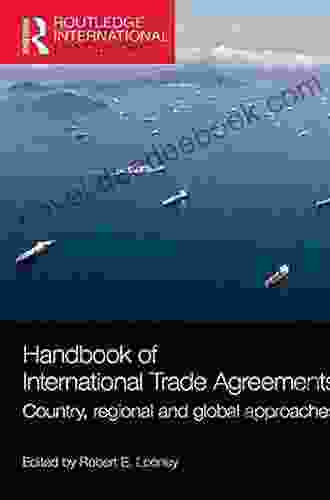Country, Regional, and Global Approaches: Routledge International Handbooks

4.8 out of 5
| Language | : | English |
| File size | : | 6432 KB |
| Text-to-Speech | : | Enabled |
| Enhanced typesetting | : | Enabled |
| Word Wise | : | Enabled |
| Print length | : | 491 pages |
| Screen Reader | : | Supported |
The study of international relations has traditionally been divided into three main levels of analysis: country, regional, and global. Each level has its own unique set of theories, concepts, and methods, and each can provide valuable insights into the complex world of international politics.
In recent years, there has been a growing recognition of the importance of all three levels of analysis in understanding international relations. This is due in part to the increasing interconnectedness of the world, which has made it clear that local events can have global consequences, and vice versa.
This article provides an overview of country, regional, and global approaches to international relations. We will begin by discussing the theoretical underpinnings of each approach, and then we will examine some of the practical implications of these approaches.
Country Approaches
Country approaches to international relations focus on the individual nation-state as the primary unit of analysis. This approach assumes that states are the main actors in the international system, and that their behavior is driven by their own national interests.
There are a number of different theoretical perspectives that can be used to analyze country approaches to international relations. Some of the most common include:
- Realism: Realism is a theory of international relations that assumes that states are rational actors that are constantly competing for power. Realists believe that the international system is anarchic, meaning that there is no central authority to enforce rules or norms. This leads to a situation in which states must constantly be on guard against threats from other states.
- Liberalism: Liberalism is a theory of international relations that assumes that states are not inherently aggressive, and that they can cooperate with each other to achieve common goals. Liberals believe that the international system is not anarchic, but rather that it is governed by a set of rules and norms that states can use to cooperate.
- Constructivism: Constructivism is a theory of international relations that assumes that states' identities and interests are not fixed, but rather that they are constructed through social interactions. Constructivists believe that the international system is not a given, but rather that it is constantly being shaped by the beliefs and actions of states.
Country approaches to international relations can be used to analyze a wide range of issues, including security, economics, and governance. For example, a realist approach to security might focus on the balance of power between states, while a liberal approach might focus on the role of international institutions in promoting cooperation.
Regional Approaches
Regional approaches to international relations focus on the interactions between states within a particular region. This approach assumes that states' behavior is influenced by their geographic proximity, their cultural similarities, and their economic interdependence.
There are a number of different theoretical perspectives that can be used to analyze regional approaches to international relations. Some of the most common include:
- Regionalism: Regionalism is a theory of international relations that assumes that states within a particular region are more likely to cooperate with each other than they are with states outside the region. Regionalists believe that this is due to the fact that states within a region share a number of common interests, such as security, economic development, and environmental protection.
- Integration: Integration is a theory of international relations that assumes that states within a particular region are moving towards greater political, economic, and social integration. Integrationists believe that this is due to the fact that states within a region are becoming increasingly interdependent, and that this interdependence is creating a sense of common identity.
- Security communities: Security communities are a theory of international relations that assumes that states within a particular region have developed a high level of trust and cooperation, and that they are unlikely to use force against each other. Security communities are often based on shared values, such as democracy, human rights, and the rule of law.
Regional approaches to international relations can be used to analyze a wide range of issues, including security, economics, and governance. For example, a regionalist approach to security might focus on the role of regional organizations in promoting cooperation between states, while an integrationist approach might focus on the economic benefits of regional integration.
Global Approaches
Global approaches to international relations focus on the interactions between states at the global level. This approach assumes that states' behavior is influenced by global forces, such as the global economy, the global environment, and the global media.
There are a number of different theoretical perspectives that can be used to analyze global approaches to international relations. Some of the most common include:
- Globalism: Globalism is a theory of international relations that assumes that the world is becoming increasingly interconnected, and that states are becoming increasingly interdependent. Globalists believe that this is due to the fact that the global economy, the global environment, and the global media are creating a sense of global community.
- Interdependence: Interdependence is a theory of international relations that assumes that states are becoming increasingly dependent on each other for their economic, political, and security needs. Interdependenceists believe that this is due to the fact that the global economy is becoming increasingly complex, and that states are becoming increasingly interconnected through trade, investment, and travel.
- Cosmopolitanism: Cosmopolitanism is a theory of international relations that assumes that individuals have a moral obligation to each other, regardless of their nationality or political affiliation. Cosmopolitans believe that this obligation is based on the fact that all human beings are members of the same global community.
Global approaches to international relations can be used to analyze a wide range of issues, including security, economics, and governance. For example, a globalist approach to security might focus on the role of global organizations in promoting cooperation between states, while an interdependence approach might focus on the economic benefits of global interdependence.
Country, regional, and global approaches to international relations provide different ways of understanding the complex world of international politics. Each approach has its own unique set of theories, concepts, and methods, and each can provide valuable insights into the behavior of states and the dynamics of the international system.
In the increasingly interconnected world of the 21st century, it is more important than ever to have a comprehensive understanding of all three levels of analysis. By combining country, regional, and global approaches, we can gain a more complete picture of the challenges and opportunities facing the international community.
4.8 out of 5
| Language | : | English |
| File size | : | 6432 KB |
| Text-to-Speech | : | Enabled |
| Enhanced typesetting | : | Enabled |
| Word Wise | : | Enabled |
| Print length | : | 491 pages |
| Screen Reader | : | Supported |
Do you want to contribute by writing guest posts on this blog?
Please contact us and send us a resume of previous articles that you have written.
 Page
Page Story
Story Reader
Reader Newspaper
Newspaper Glossary
Glossary Bibliography
Bibliography Foreword
Foreword Annotation
Annotation Footnote
Footnote Scroll
Scroll Codex
Codex Tome
Tome Bestseller
Bestseller Classics
Classics Biography
Biography Autobiography
Autobiography Memoir
Memoir Reference
Reference Encyclopedia
Encyclopedia Dictionary
Dictionary Thesaurus
Thesaurus Narrator
Narrator Resolution
Resolution Catalog
Catalog Card Catalog
Card Catalog Borrowing
Borrowing Stacks
Stacks Periodicals
Periodicals Study
Study Scholarly
Scholarly Lending
Lending Academic
Academic Journals
Journals Special Collections
Special Collections Interlibrary
Interlibrary Literacy
Literacy Dissertation
Dissertation Storytelling
Storytelling Awards
Awards Reading List
Reading List Lucile Lhoste
Lucile Lhoste Julia Sykes
Julia Sykes John Forester
John Forester Mary Katharine Ham
Mary Katharine Ham Stephen Smith
Stephen Smith Nicki Huntsman Smith
Nicki Huntsman Smith C Hallman
C Hallman Jen Hatmaker
Jen Hatmaker David Calvis
David Calvis Evie Mitchell
Evie Mitchell Emma Lombard
Emma Lombard Earl Nightingale
Earl Nightingale Dimitri A Bogazianos
Dimitri A Bogazianos Thomas O Mcgarity
Thomas O Mcgarity David Perkins
David Perkins Amy West
Amy West Matthew Dobbins
Matthew Dobbins Robert Frost
Robert Frost Jonathan Shandell
Jonathan Shandell Umeokwonna Paschal
Umeokwonna Paschal
Light bulbAdvertise smarter! Our strategic ad space ensures maximum exposure. Reserve your spot today!

 Roberto BolañoGeneva, Switzerland Holiday: The Illustrated Diaries of Llewelyn Pritchard Ma
Roberto BolañoGeneva, Switzerland Holiday: The Illustrated Diaries of Llewelyn Pritchard Ma Emmett MitchellFollow ·17.8k
Emmett MitchellFollow ·17.8k Jean BlairFollow ·5.7k
Jean BlairFollow ·5.7k Todd TurnerFollow ·9.3k
Todd TurnerFollow ·9.3k Ignacio HayesFollow ·10.4k
Ignacio HayesFollow ·10.4k Juan RulfoFollow ·2.4k
Juan RulfoFollow ·2.4k Billy FosterFollow ·15.6k
Billy FosterFollow ·15.6k Robert BrowningFollow ·10.8k
Robert BrowningFollow ·10.8k Brennan BlairFollow ·3.9k
Brennan BlairFollow ·3.9k

 Bryce Foster
Bryce FosterPerforming Asian American Women On Screen And Scene
The representation of Asian American women...

 Frank Mitchell
Frank MitchellGirl Can Draw: A Spirited and Inspiring Play by Joe...
Prologue In the realm of...

 Marc Foster
Marc FosterThe Epic Story of Race and the American Media: A Journey...
From the Shadows of Slavery to the Dawn of...

 Demetrius Carter
Demetrius CarterThe Ultimate Guide to Hiking West Virginia: Discover the...
West Virginia, often referred to as...

 Isaiah Price
Isaiah PriceThe Ten Step Guide on How to Become Famous: Unleash Your...
In the captivating world of entertainment...
4.8 out of 5
| Language | : | English |
| File size | : | 6432 KB |
| Text-to-Speech | : | Enabled |
| Enhanced typesetting | : | Enabled |
| Word Wise | : | Enabled |
| Print length | : | 491 pages |
| Screen Reader | : | Supported |










